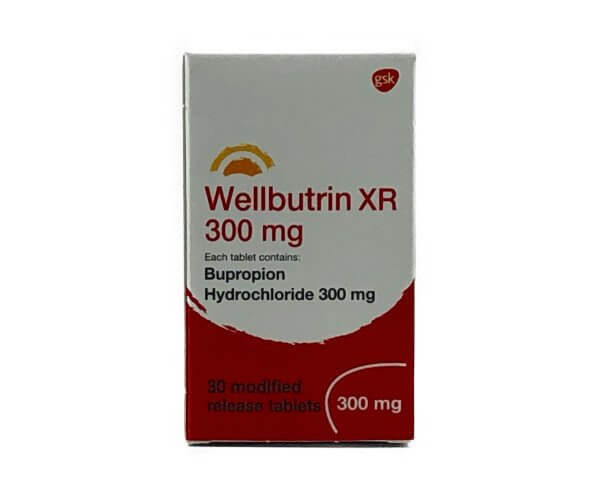Wellbutrin XL (generic name: bupropion) is prescribed to treat some forms of depression. It is mainly used to treat only adults diagnosed with Major Depressive Disorder (MDD) and seasonal affective disorder (SAD). Wellbutrin XL delivers the same compound (bupropion) as Wellbutrin SL (slow-release), but has a longer half-life, allowing it to be taken less frequently.
Bupropion is classified as an atypical antidepressant. It is most commonly used in cases of an inadequate response to the first choice of selective serotonin reuptake inhibitor (SSRI) antidepressants. Its mode of action is to increase the levels of dopamine and norepinephrine in the brain.
Bupropion can also be prescribed off-label to treat the symptoms of depression in people diagnosed with bipolar disorder or Attention-deficit/Hyperactivity Disorder (ADHD), and erectile dysfunction caused by treatment with SSRI antidepressants. It may take some time for the medicine to take full effect, in some cases up to several months. When the benefits are starting to be felt, the prescribing doctor may advise you to keep taking Wellbutrin XR to prevent the recurrence of the depression.
Dosage
The dose and schedule for Wellbutrin XL is prescribed by the attending healthcare provider.
The usualy recommended dosage is one 150 mg tablet, once daily in the morning. The dosage may be increased to 300 mg once daily if the feelings of depression do not improve after several weeks.
Take the scheduled dose with or without food at approximately the same time each day. It’s usually meant to be taken once each day, in the morning. Swallow the tablets whole. Do not chew, crush or split them, since this can cause the medicine to be released too quickly and can produce unwanted side effects due to overdosing.
If a scheduled dose has been missed, take the next dose at the usual time. Do not double-dose to make up for a forgotten dose.
Storage
Store the bottle of WellbutrinXL below 25°C/77°F in the original package in order to protect from moisture and light. The contents should only be used up to 30 days after opening. Each bottle contains a small sealed canister containing charcoal and silica gel to keep the tablets dry. This should be kept in the bottle all through the use of Wellbutrin XL.
This text is for informational purposes only. Please consult your doctor or pharmacist before using any medication.
Please read the Product Insert that comes with the medication.
Some mild side effects may be felt. Ask your doctor or pharmacist for advice if you feel depressed, anxious, dizzy, or have difficulty concentrating.
Other side effects include:
- Tremors
- Headaches
- Nausea or vomiting
- Abdominal pain
- Constipation
- Changes in the taste of food
- Dry mouth
- Fever
- Sweating
- Allergic skin rash
- Itching.
Not all side effects are listed here. If these or any other unexpected effects are experienced, and persist of worsen, consult with a healthcare provider or pharmacist as soon as possible.
Wellbutrin XR is indicated for the treatment of major depressive episodes in people diagnosed with Major Depressive Disorder (MDD) and seasonal depressive disorder (SAD).
The main symptoms in people diagnosed with Major Depressive Disorder (MDD) include:
- Depressed mood – feeling sad, empty, or tearful
- Feeling of worthlessness, guilty hopelessness, or helplessness
- Loss of interest or pleasure in everyday activities
- Loss of ability to sleep
- Changes in appetite (most people eat more than usual, but it can also be loss of appetite)
- Low energy, trouble concentrating, or thoughts of death (suicidal thinking)
- Agitation
- Psychomotor retardation
- Suicidal thoughts.
Seasonal affective disorder is a type of depression that follows a seasonal pattern, typically worsening in the fall and winter months. It is believed to be linked to low levels of sunlight, which can disrupt the body’s internal clock (circadian rhythm,) leading to feelings of depression.
Symptoms of seasonal affective disorder can vary from mild to severe and often include:
- Feelings of depression, sadness, hopelessness, and despair.
- Development of noticeable disinterest in activities that were once enjoyed.
- Cravings for carbohydrates, which results in weight gain.
- Insomnia
- Oversleeping, missing deadlines, and skipping routine scheduled tasks.
- Lower energy and increased fatigue.
- Difficulty concentrating, focusing, or making decisions.
- Restlessness or irritability.
- Feelings of worthlessness or guilt.
- Complaints of headaches, stomach problems, and joint or muscle pain.
Following a satisfactory response, continuation with Wellbutrin XR therapy is effective in preventing relapse.














